英语翻译易错语句
英语易错译句子有哪些
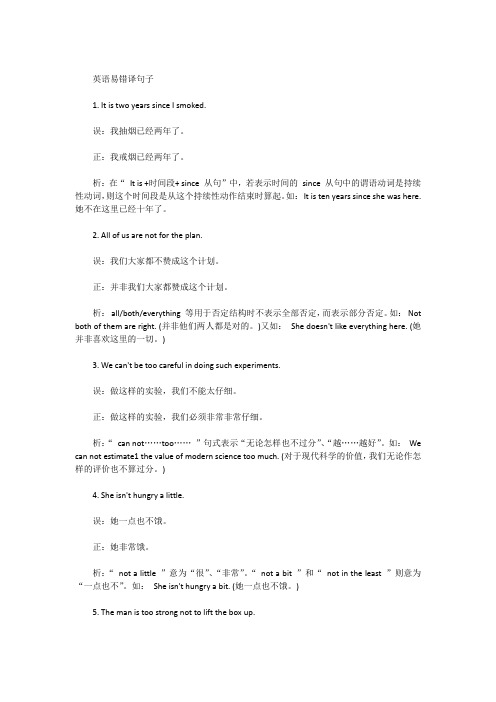
英语易错译句子1. It is two years since I smoked.误:我抽烟已经两年了。
正:我戒烟已经两年了。
析:在“It is +时间段+ since 从句”中,若表示时间的since 从句中的谓语动词是持续性动词,则这个时间段是从这个持续性动作结束时算起。
如:It is ten years since she was here. 她不在这里已经十年了。
2. All of us are not for the plan.误:我们大家都不赞成这个计划。
正:并非我们大家都赞成这个计划。
析:all/both/everything 等用于否定结构时不表示全部否定,而表示部分否定。
如:Not both of them are right. (并非他们两人都是对的。
)又如:She doesn't like everything here. (她并非喜欢这里的一切。
)3. We can't be too careful in doing such experiments.误:做这样的实验,我们不能太仔细。
正:做这样的实验,我们必须非常非常仔细。
析:“can not……too……”句式表示“无论怎样也不过分”、“越……越好”。
如:We can not estimate1 the value of modern science too much. (对于现代科学的价值,我们无论作怎样的评价也不算过分。
)4. She isn't hungry a little.误:她一点也不饿。
正:她非常饿。
析:“not a little ”意为“很”、“非常”。
“not a bit ”和“not in the least ”则意为“一点也不”。
如:She isn't hungry a bit. (她一点也不饿。
)5. The man is too strong not to lift the box up.误:这个人力气不够大,不能把这只箱子提起来。
易错的英文词汇和翻译

✔罢工之类的劳工行动
✖工业行动
bor of love
✔心甘情愿做的工作;义务劳动
✖为情所困
39.mad doctor
✔精神病科医生
✖发疯的医生
40.make one's hair stand on end
✔令人毛骨悚然,恐惧
✖令人发指,气愤
41.mug shot
✔勃然大怒;大发脾气
✖试穿
33.heartman
✔换心人;心脏移植者
✖有心人
34.horse sense
✔常识(common sense)
✖马的感觉
35.in one's birthday suit
✔赤身裸体
✖穿着生日礼服
36.Indian summer
✔深秋初冬时节宜人的天气;愉快宁静的晚年
✖印度的夏天
✖提上袜子
46.red tape
✔官僚习气
✖红色带子
47.restroom
✔厕所
✖休息室
48.service station
✔加油站
✖服务站
49.Spanish athlete
✔吹牛者;胡说八道的人
✖西班牙运动员
50.sporting house
✔妓院
✖体育室
51.sweet water
✔淡水
✖“糖水”或“甜水”
17.crow's feet
✔眼角鱼尾纹
✖乌鸦脚
18.dead president
✔美钞(上印有总统头像)
✖死了的总统
19.drawing room
✔客厅
✖画室
20.dressing room
25句易错翻译

1.我很喜欢它。
True: I like it very much.2. 这个价格对我挺合适的。
True: The price is right.suitable(合适的、相配的)最常见的用法是以否定的形式出现在告示或通知上,如:下列节目儿童不宜。
The following programme is not suitable for children在这组句子中用后面的说法会更合适。
3. 你是做什么工作的呢?True: Are you working at the moment?what’s your job这种说法难道也有毛病吗?是的。
因为如果您的谈话对象刚刚失业,如此直接的问法会让对方有失面子,所以您要问:目前您是在上班吗,Are you working at the moment,接下来您才问:目前您在哪儿工作呢, where are you working these days,或者您从事哪个行业呢,What line of work are you in,顺带说一下,回答这类问题时不妨说得具体一点,不要只是说经理或者秘书。
4. 用英语怎么说?True: How do you say this in English?How to say是在中国最为泛滥成灾的中国式英语之一,这决不是地道的英语说法。
同样的句子有:请问这个词如何拼写,How do you spell that please,请问这个单词怎么读,How do you pronounce this word。
5. 明天我有事情要做。
True: Sorry but I am tied up all day tomorrow.用I have something to do来表示您很忙,这也完全是中国式的说法。
因为每时每刻我们都有事情要做,躺在那里睡大觉也是事情。
所以您可以说我很忙,脱不开身:I’m tied up.还有其他的说法:I’m afraid I can’t make it at that time. I,d love to, but I can’t,I have to stay at home.6. 我没有英文名。
易错英语翻译
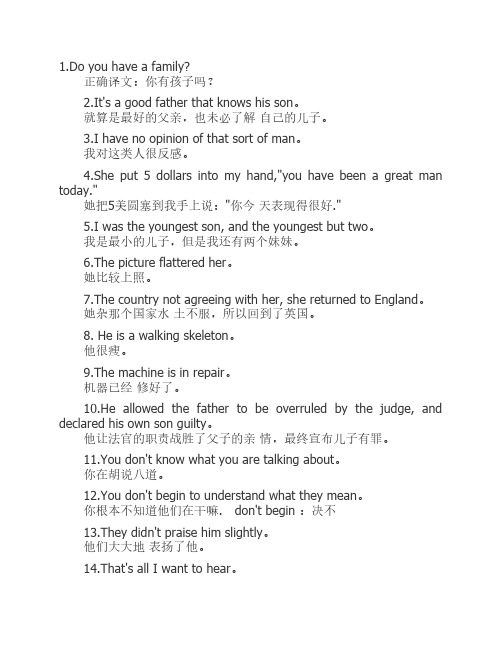
1.Do you have a family? 正确译文:你有孩子吗? 2.It's a good father that knows his son。
就算是最好的父亲,也未必了解自己的儿子。
3.I have no opinion of that sort of man。
我对这类人很反感。
4.She put 5 dollars into my hand,"you have been a great man today." 她把5美圆塞到我手上说:"你今天表现得很好." 5.I was the youngest son, and the youngest but two。
我是最小的儿子,但是我还有两个妹妹。
6.The picture flattered her。
她比较上照。
7.The country not agreeing with her, she returned to England。
她杂那个国家水土不服,所以回到了英国。
8. He is a walking skeleton。
他很瘦。
9.The machine is in repair。
机器已经修好了。
10.He allowed the father to be overruled by the judge, and declared his own son guilty。
他让法官的职责战胜了父子的亲情,最终宣布儿子有罪。
11.You don't know what you are talking about。
你在胡说八道。
12.You don't begin to understand what they mean。
你根本不知道他们在干嘛. don't begin :决不 13.They didn't praise him slightly。
英文翻译易错句30句
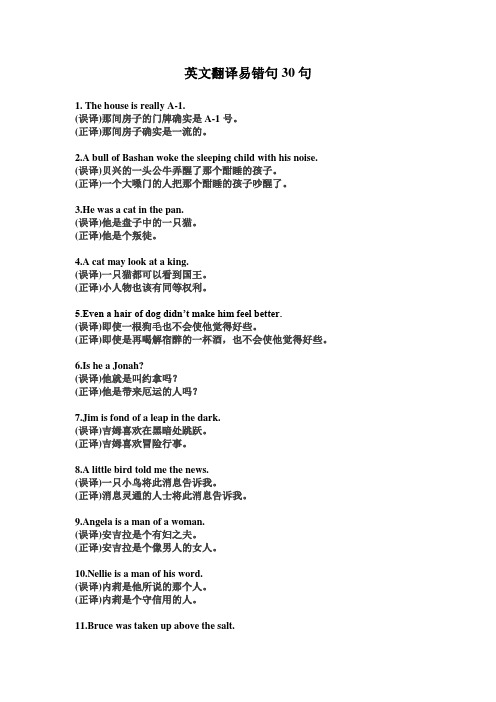
英文翻译易错句30句1. The house is really A-1.(误译)那间房子的门牌确实是A-1号。
(正译)那间房子确实是一流的。
2.A bull of Bashan woke the sleeping child with his noise. (误译)贝兴的一头公牛弄醒了那个酣睡的孩子。
(正译)一个大嗓门的人把那个酣睡的孩子吵醒了。
3.He was a cat in the pan.(误译)他是盘子中的一只猫。
(正译)他是个叛徒。
4.A cat may look at a king.(误译)一只猫都可以看到国王。
(正译)小人物也该有同等权利。
5.Even a hair of dog didn’t make him feel better.(误译)即使一根狗毛也不会使他觉得好些。
(正译)即使是再喝解宿醉的一杯酒,也不会使他觉得好些。
6.Is he a Jonah?(误译)他就是叫约拿吗?(正译)他是带来厄运的人吗?7.Jim is fond of a leap in the dark.(误译)吉姆喜欢在黑暗处跳跃。
(正译)吉姆喜欢冒险行事。
8.A little bird told me the news.(误译)一只小鸟将此消息告诉我。
(正译)消息灵通的人士将此消息告诉我。
9.Angela is a man of a woman.(误译)安吉拉是个有妇之夫。
(正译)安吉拉是个像男人的女人。
10.Nellie is a man of his word.(误译)内莉是他所说的那个人。
(正译)内莉是个守信用的人。
11.Bruce was taken up above the salt.(误译)布鲁斯坐在盐上。
(正译)布鲁斯被请坐上席。
12.Colin is absent in Shanghai.(误译)科林现在不在上海。
(正译)克林去上海了,不在这里。
13.Her opinion is all my eye.(误译)她的主张也完全是我的观点。
英语翻译易犯错误的50个例子

翻译易错的50个例子1. cabinet photograph例句:Is the cabinet photograph well taken?误译:这张全体内阁成员的合影拍得好吗?原意:这张六英寸照片拍得好吗?说明:cabinet photograph (合成名词) 是"六英寸照片"之意。
2. cakes and ale例句:She fully enjoyed cakes and ale。
误译:她充分地享用了蛋糕和啤酒。
原意:她尽享了人生乐趣。
说明:cakes and ale 意为"人生乐趣(事)". (此语出自莎士比亚著作Twelfth Night<<第十二夜>>)。
3. call例句:He has no call to flare up。
误译:他没有发怒大叫。
原意:他没有必要发怒。
说明:本例的call (名词),意为"必要","理由". 作此解时一般用于否定句和疑问句。
4. call one names例句:My grandpa told me not to call him names。
误译:我爷爷告诉我不要叫他的名字。
原意:我爷爷叫我不要骂他。
说明:call one names 意为"辱骂某人",用于口语. 值得注意的是,one一定要用宾格,而不是所有格,即不是one's."names" 一定是复数"names", 否则就不是此意. 如上例,若该成Mygrandpa told me notto callhis name. 则是"我爷爷叫我不要叫他的名字". call one's name中的name根据情况,可用单数和复数。
5. can例句:Buy up all the pineapples! We can can them。
十个容易出错的英语句子
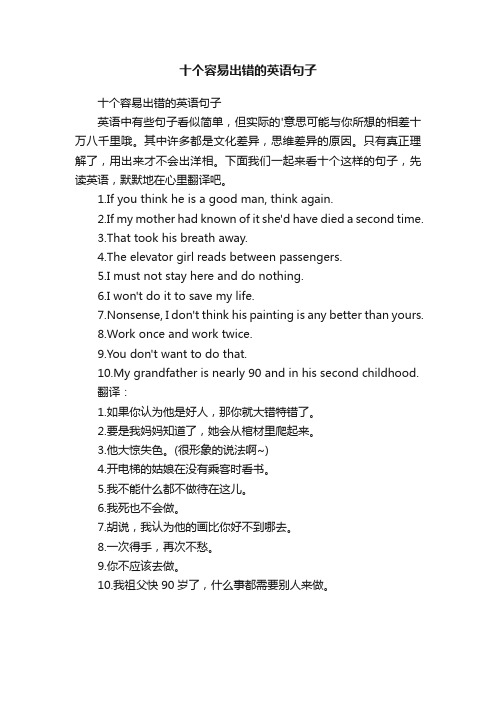
十个容易出错的英语句子十个容易出错的英语句子英语中有些句子看似简单,但实际的'意思可能与你所想的相差十万八千里哦。
其中许多都是文化差异,思维差异的原因。
只有真正理解了,用出来才不会出洋相。
下面我们一起来看十个这样的句子,先读英语,默默地在心里翻译吧。
1.If you think he is a good man, think again.2.If my mother had known of it she'd have died a second time.3.That took his breath away.4.The elevator girl reads between passengers.5.I must not stay here and do nothing.6.I won't do it to save my life.7.Nonsense, I don't think his painting is any better than yours.8.Work once and work twice.9.You don't want to do that.10.My grandfather is nearly 90 and in his second childhood.翻译:1.如果你认为他是好人,那你就大错特错了。
2.要是我妈妈知道了,她会从棺材里爬起来。
3.他大惊失色。
(很形象的说法啊~)4.开电梯的姑娘在没有乘客时看书。
5.我不能什么都不做待在这儿。
6.我死也不会做。
7.胡说,我认为他的画比你好不到哪去。
8.一次得手,再次不愁。
9.你不应该去做。
10.我祖父快90岁了,什么事都需要别人来做。
生活中英语翻译错误的例子
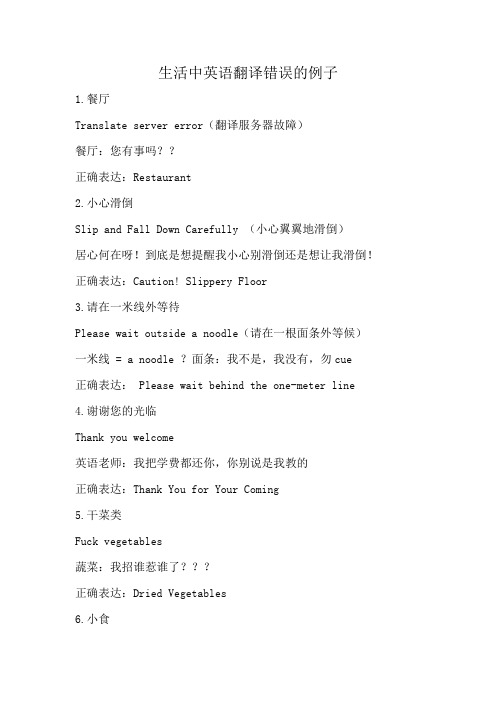
生活中英语翻译错误的例子
1.餐厅
Translate server error(翻译服务器故障)
餐厅:您有事吗??
正确表达:Restaurant
2.小心滑倒
Slip and Fall Down Carefully (小心翼翼地滑倒)
居心何在呀!到底是想提醒我小心别滑倒还是想让我滑倒!正确表达:Caution! Slippery Floor
3.请在一米线外等待
Please wait outside a noodle(请在一根面条外等候)一米线 = a noodle ?面条:我不是,我没有,勿cue
正确表达: Please wait behind the one-meter line
4.谢谢您的光临
Thank you welcome
英语老师:我把学费都还你,你别说是我教的
正确表达:Thank You for Your Coming
5.干菜类
Fuck vegetables
蔬菜:我招谁惹谁了
正确表达:Dried Vegetables
6.小食
Small food(小的食物)
small:跟我有什么关系啊,别来沾边正确表达:Snacks。
- 1、下载文档前请自行甄别文档内容的完整性,平台不提供额外的编辑、内容补充、找答案等附加服务。
- 2、"仅部分预览"的文档,不可在线预览部分如存在完整性等问题,可反馈申请退款(可完整预览的文档不适用该条件!)。
- 3、如文档侵犯您的权益,请联系客服反馈,我们会尽快为您处理(人工客服工作时间:9:00-18:30)。
1. Nobody will be the wiser.谁也不会更为聪明。
(误)谁也不懂得。
(正)注:英语形容词 wise 有三个基本意思:(1) 聪明的,如 You were wise not to go.(你不去是聪明的)。
(2) 饱学的,如 He is wise in the law.(他精通法律)。
(3)知道的,如 We are none the wiser for his explanations.(听完他的解释,我们还是不明白)。
上例便是第三义,等于说 Nobody will know it. 通常比较级,意为“至今不知道的事,现在知道了”,所谓 none the wiser= no wiser than before= as wise as before,照旧。
't you see the writing on the wall你看不见墙上的字吗(误)难道你看不到灾难的迫切吗(正)注:The writing on the wall (or sometimes 'handwriting on the wall') is an expression that suggests a portent of doom or misfortune. It originates in the Biblical book of Daniel - where supernatural writing fortells the demise of the Babylonian Empire, but it has come to have a wide usage in language and literature.lies at the bottom of the decanter.真相从玻璃酒瓶地下看出来。
(误)酒后吐真言。
(正)'t tell him home truths.不要告诉他家里的真相。
(误)不要对他讲逆耳的事实。
(正)注:Home truths are unpleasant facts that you learn about yourself, usually from someone else. (BRIT)will go a long way in overcoming the difficulty.在克服困难上要走很远的路。
(误)这在突破难关时是很有帮助的。
(正)注:go a long way = will be helpful. 又,go a little way with a person, 意为对那人一点效果也没有,对他影响很小。
has a yellow streak in him.他身上有一条黄色的纹路。
(误)他有胆小的气质。
(正)or two of the jewels would never be missed.一两粒宝石是决不会不见的。
(误)失去一两粒宝石是决不会知道的。
(正)8.Iknow he meant business.我知道他的用意在生意。
(误)我知道他不是开玩笑的。
(正)注:口语用法的 mean business = be serious;be earnest。
做生意的人是要认真的,讲求信用的,因此引伸出上面这种意思来了。
failure was the making of him.这次失败是他造成的。
(误)这次失败实为他成功的基础。
(正)注:动词 make 原是“造成”的意思,又可作“发展或发达的过程。
成功的原因或手段”解,例句中所用的便是这个意思。
making 还可以加复数,而构成“要素”,“素质”之意,如 He has in him the makings of a poet.(他有诗人的素质。
)has never recovered her loss.他永为能补偿她的损失。
(误)他用含失恃之悲。
(正)注:这是英语中最容易弄错意思的一种表现法。
英语属格分主格作用和宾格作用两种。
李据说的是宾格作用,所谓 her loss = the loss of his mother, 而不是 his mother's loss, 不是他母亲的损失,而是他失去母亲。
如果说成 She has never recovered her loss. 就是主格作用,因为 She 和 her是同一人,her loss就是她的损失。
从及物动词变来的名词,就能有这两种作用。
could do with more leisure time.有更多的闲暇我就能做好了。
(误)要再多一些闲暇就好了。
(正)注:can do=be satisfied with; be content with, 满足,忍受。
在 do 之前用can的过去could 时,便有“要能得到就好了”,“想要”的意思,不过常出于戏言。
That man could do with a shave.(那人要把胡子剃光就好了。
)is now in a delicate condition.她现在是在一种微妙的状态中。
(误)她现在是在怀孕中。
(正)注:分辨 a delicate condition 和 a delicate situation, 后者意为“困难的局势“。
is brave like anything.他像任何东西一样的勇敢。
(误)其勇无比。
(正)注:like anything,意为拿任何东西来譬喻都不相称,引申而成“非常”,“不劣于任何东西”之意。
is said that his days are numbered.据说他的日子都计算好了。
(误)据说他的死期已近。
(正)注:number 用作被动是,有“为数可数”之意,即“有限”,“无多”,“迫切”的意思。
传说人寿有定,当生命将尽时,可以说 His hour has come. 或 Hiscourse is run.is time he began to work.这时他已经开始工作了。
(误)现在是他应该开始工作的时候了。
(正)注 It is time+主语+过去分词就和 It is time for+宾语+不定式一样的意思。
句中的过去动词是一种假设语气的用法,例如 It is time I was going.(我早应该告辞了。
)may be drowned for all I care.不顾我怎样当心,他或许仍然会溺死的。
(误)他也许会溺死,但我毫不介意。
(正)注:for all I care= I don't care if. 英语说的for all 或 with all, 实有不顾(notwithstanding)之意,如 For all his wealth, he is unhappy.(他虽有那么多的钱还是不快乐。
)is no love lost between them.他们之间并未失掉爱情。
(误)他们非常不和。
(正)注:这是委婉的说法,意为他们之间根本无爱情可言,换言之,There is hatred between them.(他们之间只有憎恨。
)had words with her.他和她谈过话了。
(误)他和她口角了。
(正)注: have words with 或 exchange words with,为互相争论或口角之意。
本例也可说成 They had words together. 英文的words,常有吵嘴的意思,如proceed from words to blows(由争论而至打斗)。
19. He was laid up for a few days.他被安插好几天了。
(误)他病倒两三天了。
(正)注:因病或伤睡在床上,英文说 lay up, 如 be laid up with illness(卧病);be laid up with a broken leg(因折腿不能起床)。
20. He took my advice in good part.他接受了我的忠告最好的部分。
(误)他嘉纳了我的忠言。
(正)注:take sth in good part,意为“善意地接受”或“顺受”。
相反的说法有 in bad(或ill)part,则为“不悦”或“逆受”。
is a wise man that never makes mistakes.聪明人从来不做错事。
(误)智者千虑必有一失。
(正)注:此句照字面解释,似应照误句的译法,不过这是一句古来的谚语,凡“it is ...that (who)"的构造,都含有“无论怎样……都不免”的意思。
参考下列各句:It is an ill wind that blows nobody good.(害于此者利于彼。
人病医生喜。
人死和尚乐。
)It is an ill bird that fouls its own nest.(自诽其家者未之有也。
家丑不可外扬。
)It is a good workman that never blunders.(无论怎样好的工人有时都不免做错。
)It is a long lane that has no turning.(否极泰来。
)It is a wise mother who knows her own child.(为母者不知其子之恶。
)It is a good divine who follows his own instructions.(能说者不能行。
)parted the best friends.我们和最好的朋友别离了。
(误)我们在分别时是极好的朋友。
(正)注:part 是一个不及物动词,the best friends 为补语。
failed, myself among the rest.有二十人落第,但我自己不在内。
(误)落第者二十名,我自己也是其中之一。
(正)注: the rest, 原意为“其余”,如 as for the rest(至于其他之点)。
但among the rest, 则系一个成语,意为 among the number(就在那个数目之中)。
is dead, as I live.他死了,我还活着。
(误)他的的确确是死了。
(正)注:as I live 在此意为indeed,是加重前面主句的。
英语还有其他类似的说法,如 as I am here, as the sun shines, as you stand here, as my nose is on my face 等等。
will make you a good wife.她将是你做一个好妻子。
(误)她将成为你的好妻子。
(正)注:这个make 是完全及物动词,采用了两个宾语,前面的 you 为间接宾语,后面的good wife为直接宾语。
